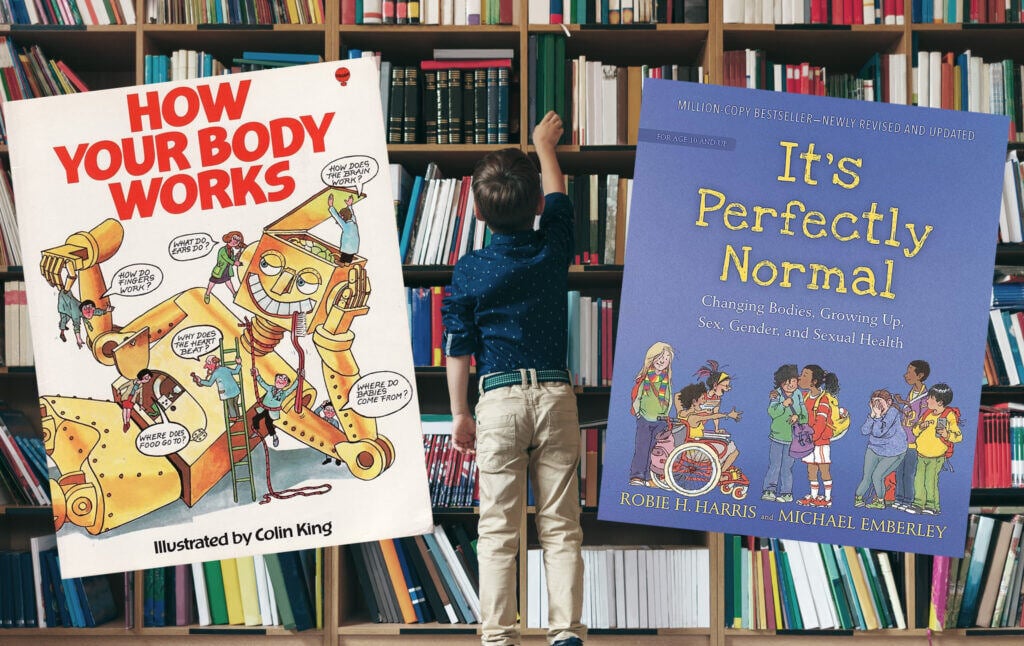
Why Are People Frightened That Kids Will Learn About Sex?
Is it reasonable for parents to panic at cartoon nudity in school textbooks? Only if we embrace irrational taboos about bodies.
I learned what sex was when I was 4 years old, though I didn’t understand what I had learned until much later. At that age, I read everything I could get my hands on (my father says my first word was “book”),* and one volume that made it into my giant stack of children’s books was How Your Body Works by Judy Hindley and Colin King, which appears to have first been published in 1975. I guess my parents didn’t realize it wasn’t “age appropriate,” since the illustrations are utterly charming.
How Your Body Works presents the human body as a kind of big Rube Goldberg machine, and I remember being completely captivated by its whimsical depictions of every part of the human contraption. Hindley and King clearly understood that kids love gross stuff, so it didn’t shy away from showing bright-green vomit and dark brown poo:
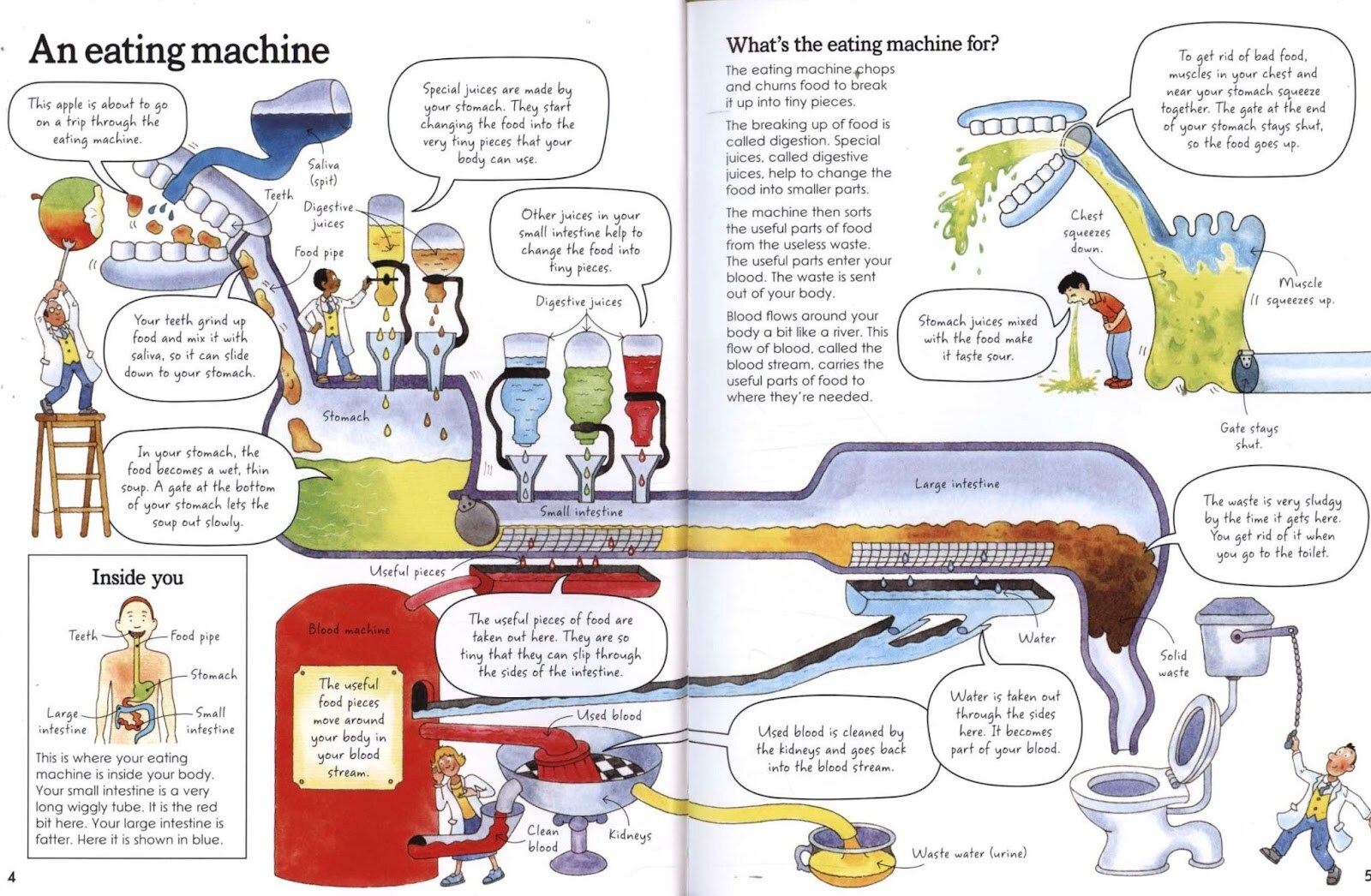
It also depicted sex, and it was only when I was an adult and picked the book back up (there’s a box full of my old children’s books in the guest room closet) that I realized the sex pages were, well, incredibly explicit. Since the book depicts the various human organ systems as machines, it wasn’t visually realistic. But it sure was frank. Get ready.
[Content warning: Colorful robots making babies.]
1.

2.
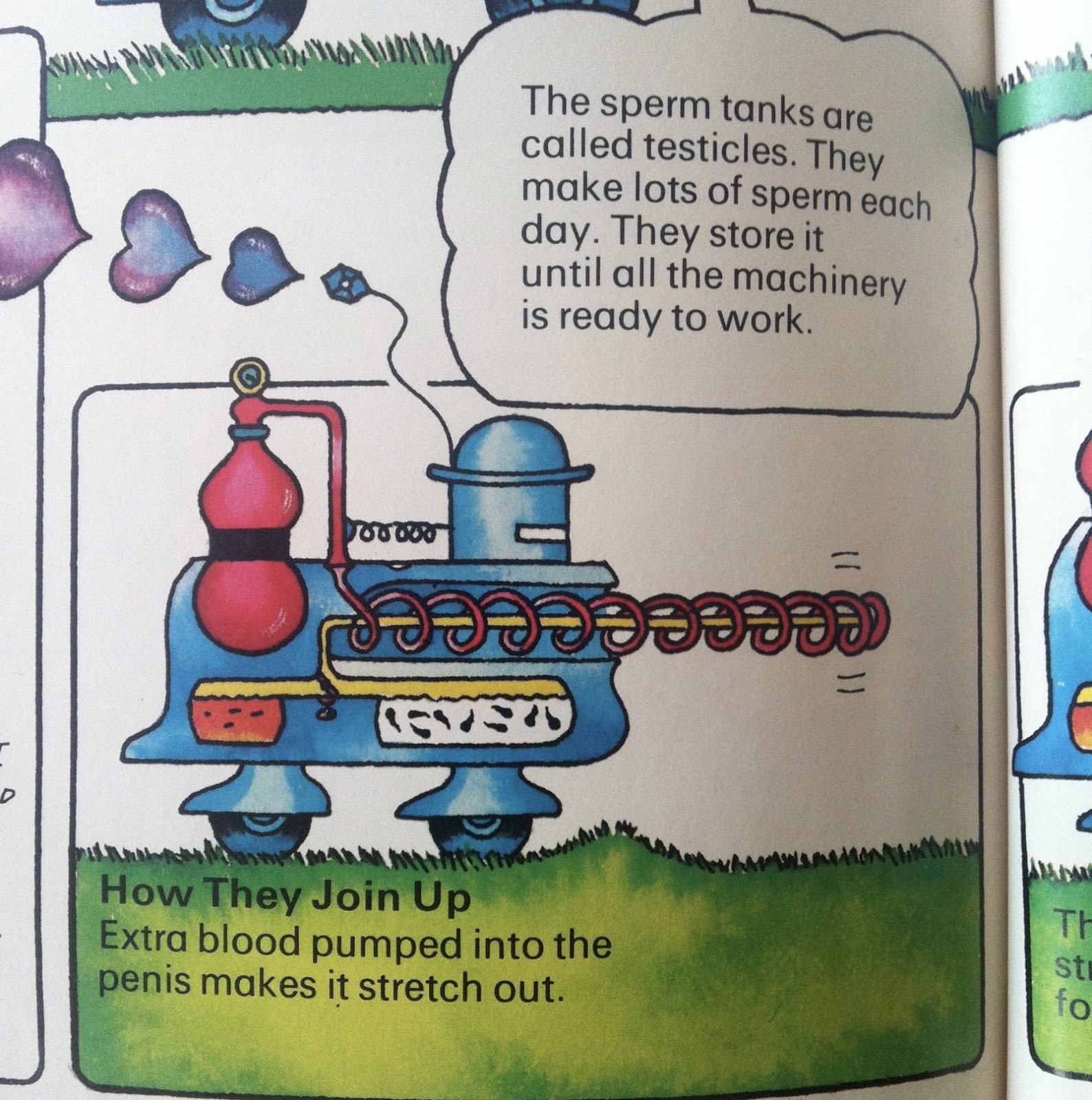
3.
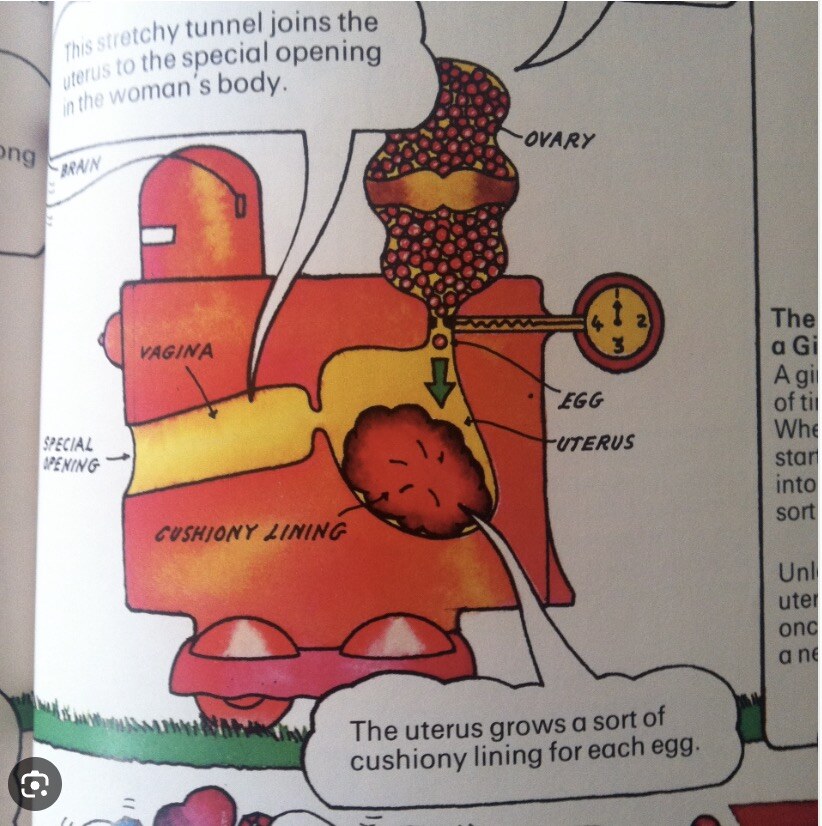
4.

5.
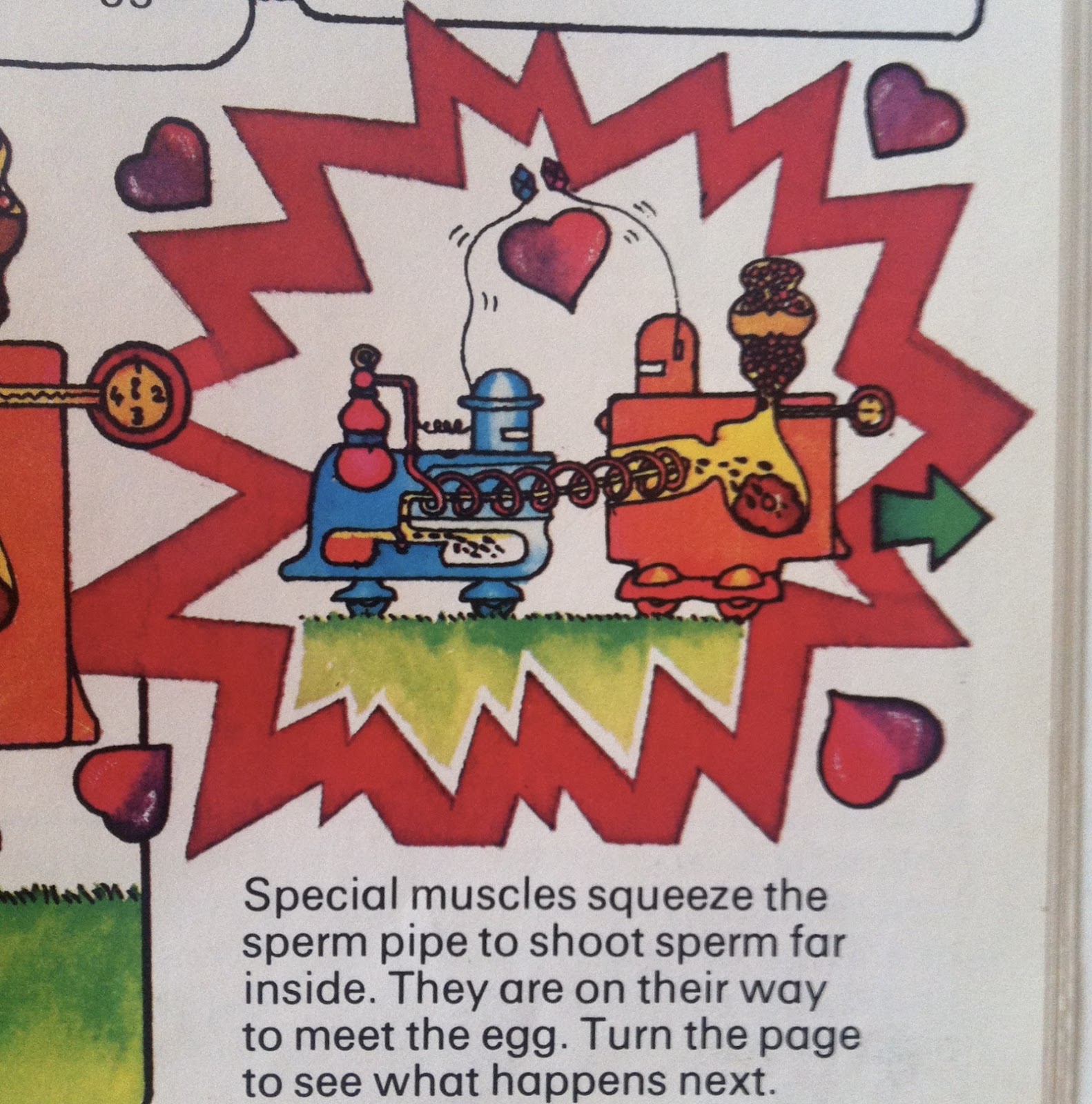
As you can see, this is pretty blunt, and it definitely stayed in my memory because I always remember the eggs that looked like a gumball dispenser.
I don’t know whether my parents noticed these pages. If they didn’t, I doubt they would have cared. They didn’t show me R-rated movies when I was young, but they also didn’t actively try to hide the “facts of life” from me. I don’t remember ever having a conversation about “how babies are made,” probably because I eventually realized what the illustrations from How Your Body Works actually meant and no explanation was needed.
I thought about How Your Body Works when reading a recent article in Slate by a parent who is (sort of) defending the instinct behind conservative book bans. The writer, Aymann Ismail, says that his instinct was to think that these ban efforts were ridiculous, but then he picked up one of the most banned books, It’s Perfectly Normal: Changing Bodies, Growing Up, Sex, Gender, and Sexual Health by Robie Harris. The book, he says took him by surprise:
I felt sure that as a 34-year-old father of two there would be nothing in there that would offend my sensibilities. I’d heard nothing but glowing reviews from sex-ed pros about the child-friendly language in the book. But flipping through the book’s pages finally, I was a little shocked. I had an involuntary reaction to seeing the nude cartoons, like I needed to make sure I was alone and hide the book. I skimmed ahead to look at the rest of the book briskly. On virtually every page I stopped to examine, I was confronted with detailed drawings of genitals. It felt like every page had a cartoon of a naked body.
Ismail quotes an outraged parent reviewing the book who counted the nude cartoons: “Seventy-eight. That’s correct—78. I didn’t even count the random, naked body *parts*. Just the naked bodies, showing genitalia.” Others wrote comments online like “is it absolutely necessary to show kids these graphic illustrations of sex and masturbation?” and “I was able to teach my children about sex without this filth.”
It’s true that It’s Perfectly Normal has a lot of cartoon nudity. It’s a book about bodies and sexual health, and it explains what different body parts are and what they do, and so it shows pictures of them. Ismail says he could see why parents would be shocked. “In the chapter “Making Love,” there are three graphic images that show adult bodies having sex. There is no visible penetration, but it’s still eye-popping.” He says he “hoped that I’d have lost all of my discomfort in looking at these naked cartoons by now, but truthfully, I still felt like I shouldn’t be looking at them—to say nothing of my kids.”
[Content warning: even more explicit cartoons!]
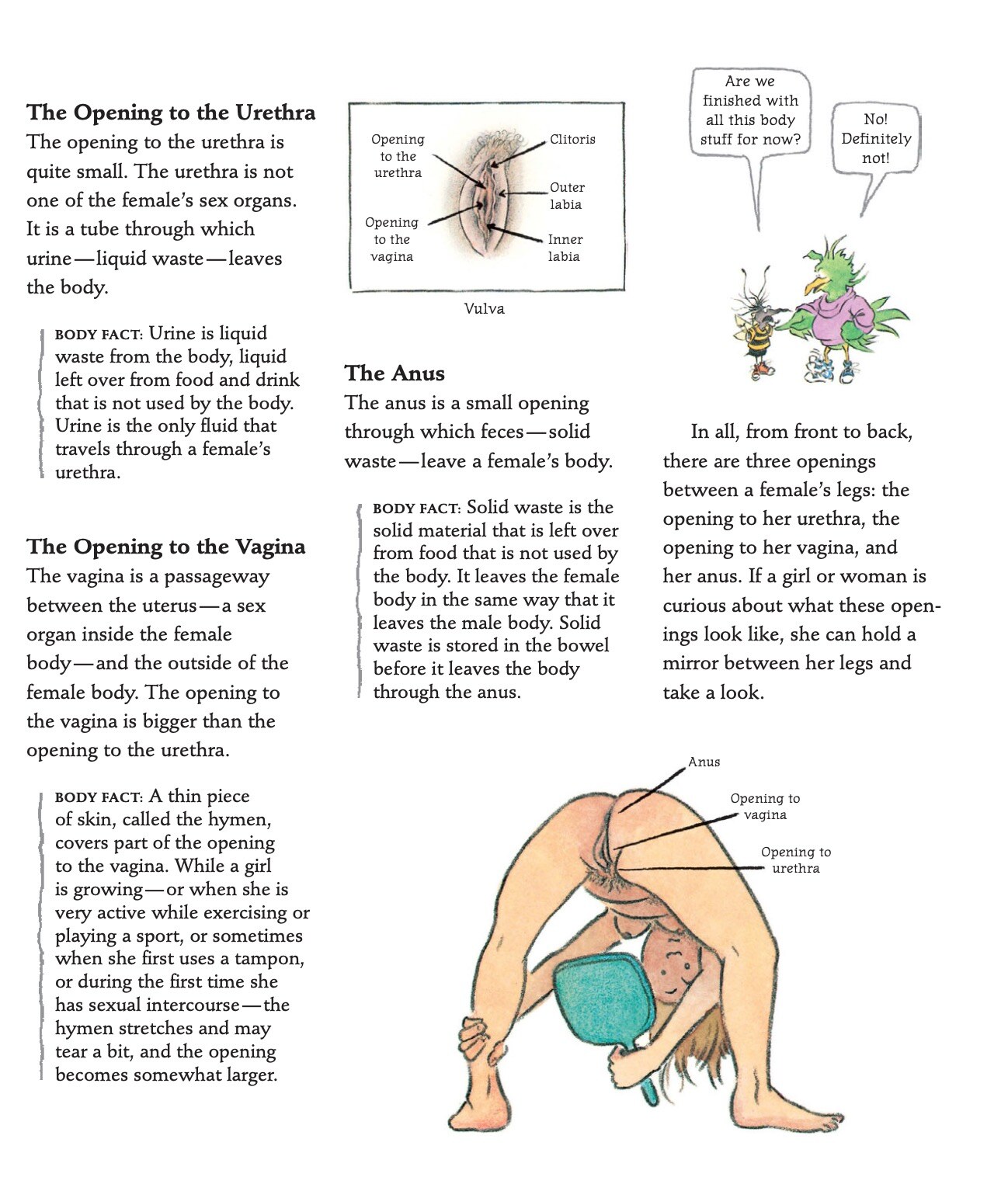
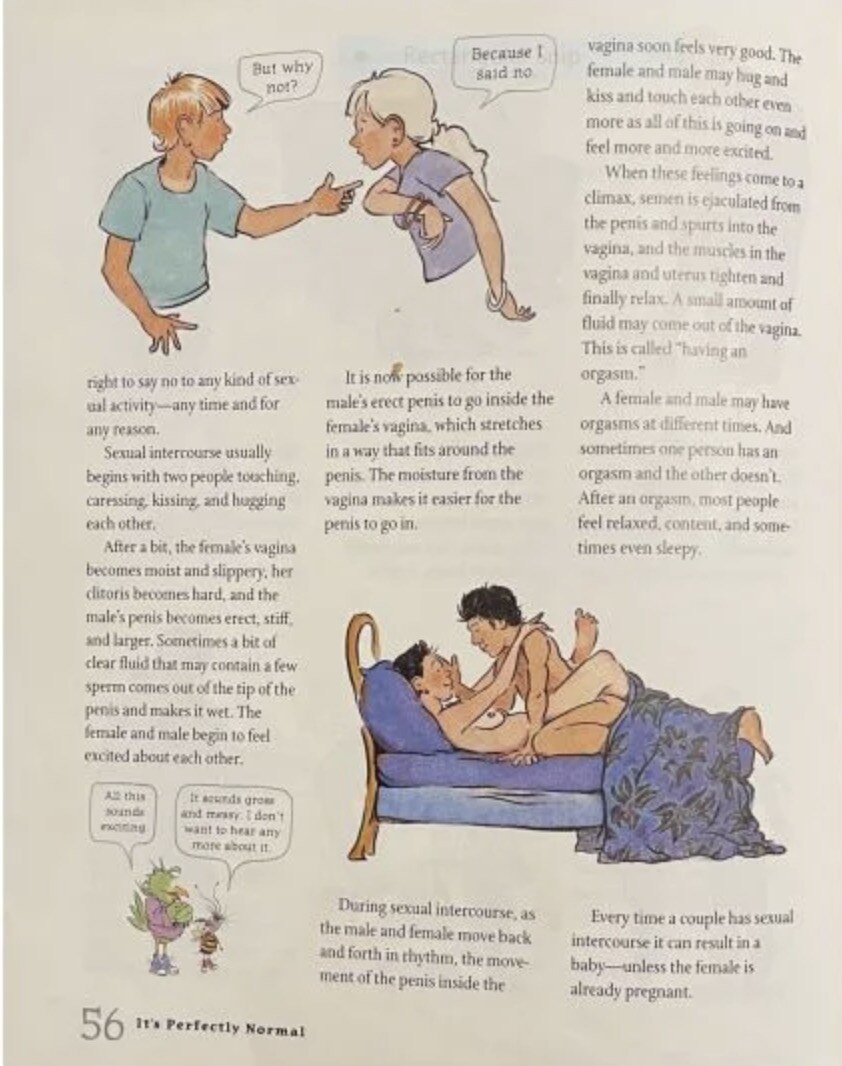
To his credit, Ismail eventually came to see It’s Perfectly Normal as “a meaningful book intent on destigmatizing everything from puberty to sex, birth, and STDs” and says that “so much of the information in this book would have made a huge difference” to him when he was young. But he thinks that parts of the book seem “gratuitous and inflammatory to parents who might be even more prudish and queasy than I am.” “Is it so crazy not to want them to be able to find this in the library?” he asks. The book even has little cartoon images of naked people having sex (no penetration is shown, making it arguably a little more cautious than How Your Body Works). Ismail quotes one parent saying “If that isn’t pornography, I don’t know what is.” Ismail disputes that characterization (the images are clearly educational, not for titillation) but he does think the “10 and up” age label is “startling.”

But really, why should it be? Here’s what mystifies me about all the right-wing panic about sex education: I have never really understood why nude bodies cause some people such horror. I mean, we’ve all got bodies. Everyone, no matter how young, has seen at least their own genitals before, so it’s not like the existence of genitals is a surprise to them. Why do we have this weird taboo about certain parts of the body?
Prudish attitudes toward sex and nudity have always seemed one of the strangest aspects of our culture. I genuinely don’t get it. Why would a parent be horrified at little cartoons showing what testicles are? Why should a child not understand what a testicle is? Ismail says he was startled and shocked by the book’s casual nudity. But what I wish he’d reflected on more deeply is: why? Why do you recoil when you see the normal processes of human development and reproduction depicted in a matter-of-fact way? What is there to fear about this?
Obviously part of it is that there is a kind of mental alarm bell that goes off anytime “sex” and “children” are in the same sentence, because everyone is rightly horrified by child sexual abuse and pedophilia. But protecting children from sexual abuse (which It’s Perfectly Normal has a whole section on) is not the same as protecting them from a knowledge of what sex is. Why is it so hard to keep this distinction clear? Why care whether kids find out about sex when they’re young? Like I say, I read about it when I was four. I didn’t understand it, in fact I forgot most of what I’d read except the little pictures. But it did absolutely nothing to hurt me, and I don’t see how cutting out the reproduction pages of How Your Body Works would have made my development any more healthy.
The central, and I guess radical, premise of It’s Perfectly Normal is exactly what the title says: sex is normal. Many parents are disturbed that the book tells young people that masturbation is natural and okay. This is an idea so shocking in the U.S. that Bill Clinton fired his surgeon general when she endorsed it. But come on! Everyone knows it’s true. Aside from the “NoFap” movement, most people masturbate. Why pretend this isn’t true? Why try to stigmatize it and make young people feel ashamed over something everyone else is secretly doing?
I say thank God for sex-positive education. Repressive taboos do not help young people. Consider the taboo on discussing menstruation. I recently interviewed Congresswoman Grace Meng about her “Menstrual Equity For All” act, and she noted that even though access to period products is crucial and the lack of access causes significant harm, there’s still a frustrating widespread idea that discussing menstruation is embarrassing:
Periods in general have very much been a taboo topic in our society. You can ask any person who gets their period: we all share the experience of hiding the product in our sleeves, of making sure no one around us knows that we are at that time of the month, even though it’s a natural part of our bodily functions. We just really haven’t talked about this enough. I’m pretty sure that some of my colleagues have signed on to my bill because they wanted me to stop talking about periods on the floor of the House.
We should find this weird. Why should there be a particular health issue that’s more uncomfortable to discuss on the floor of the House than any other? It’s Perfectly Normal is a factually accurate and helpful book that tells kids bluntly what puberty is, what their organs do, what desire is, and how to feel comfortable in their bodies. I disagree with Ismail that it’s reasonable to be horrified by this. It’s certainly common. I understand why books that tell kids about sex are causing conservative parents to freak out, because conservative parents hold a bizarre belief that everyone has to just pretend sex isn’t happening all around the world all the time. For some reason, this totally normal part of life must never, ever be discussed openly, and kids especially must for some reason believe in storks until a certain age. (Also, newsflash: There is no option for kids not to learn about sex. There are two options, which are that kids learn about sex from the bizarre misinformation they’ll get from other kids or they learn from adults, whether parents or professional sex educators.)
It’s long past time to interrogate our strange cultural discomfort around nudity and sex. We are all made of flesh. Why is there any debate at all about whether it’s okay for a child to see a nude body in an educational textbook? And yet we live in a country where a teacher can get fired for showing a great classical sculpture to students, because the sculpture has a penis and penises are the one part of the male anatomy never to be seen or discussed. The Attorney General of the United States even once had Lady Justice’s figure covered up because Lady Justice has nipples, and female nipples (although inexplicably, not male nipples) must be kept from view, lest an innocent child come to the conclusion that women have breasts.
So I’m not nearly as sympathetic to conservative book bans as Ismail is, even when there are naked people in the books. It’s long past time we asked ourselves: why the hell do we fear naked people so much? Why conceal from kids how their bodies work? Freakouts over sex education are some of the silliest things our culture has yet produced.
* A photo of the author at a young age, engrossed in edifying literature:





